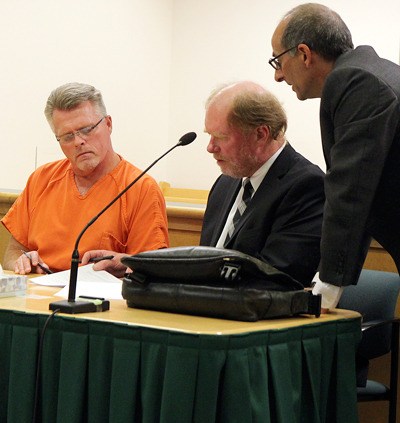A Camano Island man’s rape conviction was vacated Tuesday because a former deputy prosecutor didn’t disclose potentially exculpatory evidence to the defense.
Bryan Ross, 55, pleaded guilty to conspiracy to commit indecent liberties by forcible compulsion, a lower-level felony sex crime, as part of a plea bargain. The judge sentenced him to 51 months, the maximum under the standard sentencing range; he was released from prison this week after having already served 61 months.
Ross was originally convicted of the second-degree rape of a disabled woman in his home in 2010. He has maintained his innocence.
Island County Prosecutor Greg Banks alerted Ross’ attorneys to the error after discovering the undisclosed evidence last year; he also opened an internal investigation. The appeals court remanded the case back to superior court.
In court this week, Banks said his office failed the victim, failed the court and even failed Ross by not following laws that protect the rights of the accused.
“It’s an understatement to say that I’m embarrassed and extremely disappointed that this happened under my leadership and in my office,” he said.
The victim couldn’t bear to be in the same room as Ross, but asked a legal assistant to read a statement. She wrote that she doesn’t fully understand the legal technicalities that allowed him to go free, but that it didn’t change the facts of what he did.
She described how she fought him as he tossed her around “like a rag doll” and raped her, changing her life forever.
Colleen Kenimond, the former chief criminal deputy prosecutor, handled the case against Ross.
Island County Sheriff’s Detective Laura Price, who is now a sergeant, investigated the case and found at least six other women who accused Ross of sexual assault, according to Banks’ internal investigation of the case. One of those other women testified against Ross at trial.
Banks, however, said his assistant discovered the undisclosed evidence related to the witness while fulfilling a public records request.
The witness testified that she had been raped by Ross in circumstances similar to the rape he was charged with. But the woman also disclosed to the detective that she had a consensual sexual encounter with Ross after the assault; she explained that she was desperate and homeless, so she went to him for help even after what he had allegedly done, the court documents state.
Such information could be used to impeach or discredit the witness on the stand and needed to be shared with the defense under the rules of discovery, according to Banks.
Price had told Kenimond about the evidence but was told to keep it out of her report. Banks said the detective expected Kenimond to review the matter with the witness and then determine whether it needed to be documented; Kenimond also said that was her intent.
The witness contacted Kenimond’s legal assistant about her concerns that her testimony could hurt the case. The legal secretary relayed the information to Kenimond.
For some reason, however, the information wasn’t disclosed to Ross’ attorney.
Banks had a staff member contacted Kenimond, who remembered the information but thought that she “most likely” disclosed it to the attorney, according to his investigation. She also said she would have expected Ross to let his attorney know about the consensual encounter.
Ross’ attorney, however, said he didn’t even recognize the woman at trial.
The pre-sentence investigation report by the Department of Corrections and Price’s investigation describes how Ross found a long line of sex partners by approaching women, especially those who appeared vulnerable, in grocery stores and other public places and inviting them to his home.
He claimed he was a former police officer or Navy SEAL; many of the women consented to have sex with him, but if they didn’t, he would force them, Kenimond claimed in court.
He was married six or seven times; two of his ex-wives claimed that he had raped them, the pre-sentence investigation states. One of the women claimed he cheated on her with about 50 other women, the investigation states.
Neither Ross nor his new attorney, Craig Platt, had much to say in court.
“Mr. Banks has behaved in the most honorable way possible,” Platt said.
Banks said he expects there may be a bar complaint against Kenimond, though he doubts that she withheld the information on purpose.
“While it may not be for me to determine, I do not believe that Ms. Kenimond intentionally ‘buried’ the evidence, or acted with ill intent,” he wrote in the report.
“She carried a significant case load at the time.”



